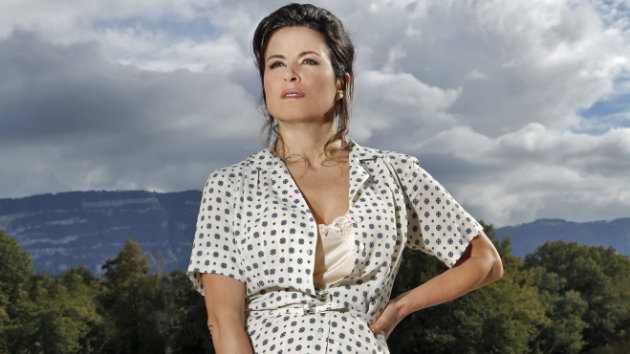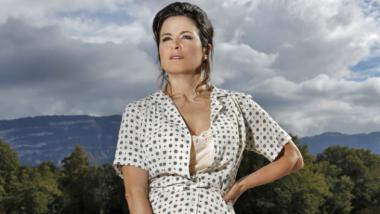
How do you bring stark scenes of wartime Italy to the stage of the Opera House for the world premiere of Marco Tutino's Two Women?
The answer is neither the obvious "very carefully" nor "with great difficulty," although both are true. Straight-shooting stage director Francesca Zambello, who believes productions should not overwhelm operas, puts it simply:
The production has a realistic quality the same way the film is realistic and the music is inspired by verismo. This gritty quality is suggested through a very simple set that uses projections for images of war and to convey the historical moments.
Zambello, who says she has directed "about 25 world premieres" (several for San Francisco Opera, as well as the last Ring Cycle), is much taken by the leading character of Cesira (Sophia Loren in the film, Anna Caterina Antonacci in the opera), a strong woman facing overwhelming adversity:
She is a mother devoted to her daughter. Her love for her daughter is the source of energy for her character and also her downfall. Everything she does is for Rosetta [the daughter, sung by Sarah Shafer], to the point of selling herself.
Two Women is best known as Vittorio De Sica's 1960 film, giving Loren her first big hit, complete with an Academy Award for Best Actress, but the origin of the story is Alberto Moravia’s 1958 novel. The Italian title for novel and film is La Ciociara — a woman, such as Cesira, from the province of Ciociaria, a poor, mountainous region.
Cesira is a shopkeeper in Rome, escaping the city, about to be occupied by German troops and bombed by the Allies, taking her daughter back to her village to await the end of the war. They endure hunger, cold, and all kinds of adversity for nine months, but the worst comes after liberation. On their way back to Rome, the women are attacked and Rosetta is raped by Moroccan soldiers of the French Army, leading to the work's complex, emotional, and dramatic finale as mother and daughter search to find their way back to their humanity.
The factual basis for the story is that after the lengthy and brutal Battle of Monte Cassino, in 1944, colonial troops of the French Expeditionary Corps, commanded by General Alphonse Juin, raped as many as 7,000 Italian women, ranging in age from 11 to 86, killing some 800 civilians who tried to protect their wives and daughters.
For the opera, both book and film are superseded by the opera's libretto, written by Tutino and Fabio Ceresa, an assistant stage director for Milan’s La Scala. The libretto introduces a new major character, Giovanni (baritone Mark Delavan), to contrast with the idealistic Michele (tenor Dimitri Pittas). "You cannot have a tenor and soprano in love without a baritone as the villain." - Marco Tutino
As Tutino said about his 15th opera at a press conference, "You cannot have a tenor and soprano in love without a baritone as the villain."
San Francisco Opera Music Director Nicola Luisotti, who had persuaded S.F. Opera General Director David Gockley to commission the work and will conduct, says the new opera has "lush and powerful music that communicates directly with the audience. With Marco’s dramatic and lyrical compositional style, we are at the doors of a possibility to bring back a ‘new verismo’ period of truly beautiful operas.”
The subject, Luisotti says, "is very operatic and involves Italian and American people in a very dramatic moment of our mutual history, leading up to the liberation of 1940s Italy from the [German] Nazis and [Italian] Fascists."
Gockley says the work is "in direct line in the great tradition of Italian opera." It is the first time that Gockley, who has commissioned more than 40 new operas, has reached out to Italy to premiere in this country a new opera with a "lush musical palette of Puccini, Leoncavallo, and Mascagni."
It may be a first such venture for a major company since the Met gave the 1910 world premiere of Puccini's The Girl of the Golden West and the 1918 premiere of his Il Trittico in New York.
Zambello notes how current this 70-year-old story feels as women today are imperiled in countless armed conflicts around the world, and rape is often used as part of warfare. "History teaches us lessons, we just don't always listen," she says.

